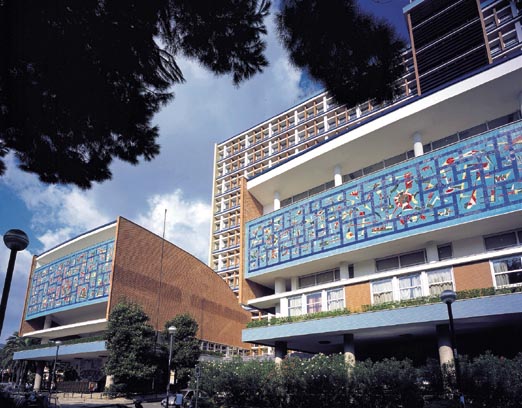With the gradual overcoming of the technocentric vision typical of Industry 4.0, the emergence of the Industry 5.0 (I5.0) paradigm highlights the importance of a broader integration of human, environmental, and social factors into technology, progress, and innovation (Troisi et al., 2023).
The emergence of I5.0 opens the paradigm of Innovation 5.0, representing a significant shift in our socio-technical systems towards a transformative phase (Carayannis et al., 2023). It combines technological progress with social equity, ecological responsibility, and a deep understanding of human involvement in innovation (Latino, Menegoli, et al., 2024). Innovation 5.0 is characterized by distinctive features when viewed through the sextuple helix model (Afzal et al., 2024).
Firstly, it encourages broader societal involvement by engaging citizens, communities, and civil society organizations in the innovation process through media and ICT, ensuring alignment with society’s needs and values. Secondly, it leverages the power of media and ICT to facilitate seamless communication, collaboration, and knowledge sharing among stakeholders, thereby accelerating the pace of innovation.
Thus, Innovation 5.0 can be conceptualized as the complex and multi-level process resulting from the implementation of a technological ecosystem that should be effectively activated by skilled and empowered human resources for the creation of new value and knowledge (Latino, De Lorenzi, et al., 2024). Through processes of acquisition, sharing, creation and use of knowledge, actors can exchange and renew their skills, creating a capital of power, which can enable Innovation 5.0. All this in a scenario where innovation ecosystems are protagonists in the development of innovation without neglecting the social well-being (Troisi et al., 2023).
The rapid growth of advanced technology is transforming innovation ecosystems. These ecosystems are complex systems of individuals, businesses, governments and institutions in which Society 5.0 strives to foster innovation, generate opportunities for new businesses and stimulate economic development (Oh et al., 2016). Technologies like AI, blockchain, and big data analytics empower entrepreneurs to develop efficiently, decrease operational expenses, and enhance decision-making processes (Kim & You, 2020). The interplay between advanced digital technologies and ecosystems is essential for enhancing competitiveness, fostering innovation, and enabling collaboration among various stakeholders (Secundo et al., 2020a; Secundo et al., 2020b).
Among digital technologies, artificial intelligence (AI), is experiencing rapid development that has the potential to disrupt and revolutionise many business ecosystems (Palmiè et al., 2020; Barile et al., 2024).
Moreover, AI technologies provide unparalleled opportunity for companies to scale quickly by leveraging data-driven insights and automating operations that would often necessitate considerable human and financial resources (Mubarik et al., 2020). Start-ups, particularly in the technology and services sectors, employ artificial intelligence-driven solutions to customise user experiences, forecast market trends, and enhance company strategies in real time (Kim & You, 2020). For example, AI is key to streamlining operations, improving productivity and reducing operational inefficiencies (Mubarik et al., 2020) supporting predictive analysis, improving decision-making and optimizing resource allocation along the value chain (Kim & You, 2020).
AI and other Advanced digital technologies, such as Blockchain and Big Data Analytics, are crucial for encouraging collaboration by enabling the commercialisation of novel ideas.
The need of collaboration between humans and intelligent technology realizes a pivotal advancement within innovation ecosystems within Innovation 5.0 scenario (Basyuk et al., 2023).
Furthermore, the emergence of I5.0 redefines the role of technology, introducing greater collaboration among government, universities, industry, civil society and the environment (Carayannis et al., 2023).
Although this demonstrates the growing global attention on the topic of innovation ecosystems in the context of I5.0, the field of research on the link between innovation ecosystems and advanced technologies is still in its infancy and there is a lack of understanding of the meanings, purposes and opportunities thus paving the way for an interesting and unexplored research path.
For this evidence, this thematic track invites scholars to reflect on the role of Advanced Technologies in Innovation 5.0 scenario as enabler of Ecosystems. Therefore, we welcome empirical, methodological or conceptual papers related to (but not necessarily limited to) the following research questions:
- What role do Innovation 5.0 intermediaries play in accelerating the development and adoption of advanced technologies in ecosystems?
- Which advanced digital technologies influence the scalability, growth, and sustainability of startups within ecosystems?
- Which strategies and actions leverage advanced technologies (e.g., AI, blockchain, big data) to foster collaboration, knowledge exchange, and Innovation 5.0 in ecosystems?
- What role does academia play within the ecosystem context in facilitating the adoption of technologies in Innovation 5.0 scenarios?
- How can I5.0 technologies reshape the relationship between humans and machines in ecosystems toward sustainability and a resilient paradigm?
- How do advanced digital technologies influence the scalability, growth, and sustainability of startups within ecosystems?
- How do digital and advanced technologies impact the development of Innovation 5.0 in ecosystems?
- How do ecosystems evolve to adapt to the foundations of the Innovation 5.0 paradigm: sustainability and resilience?

